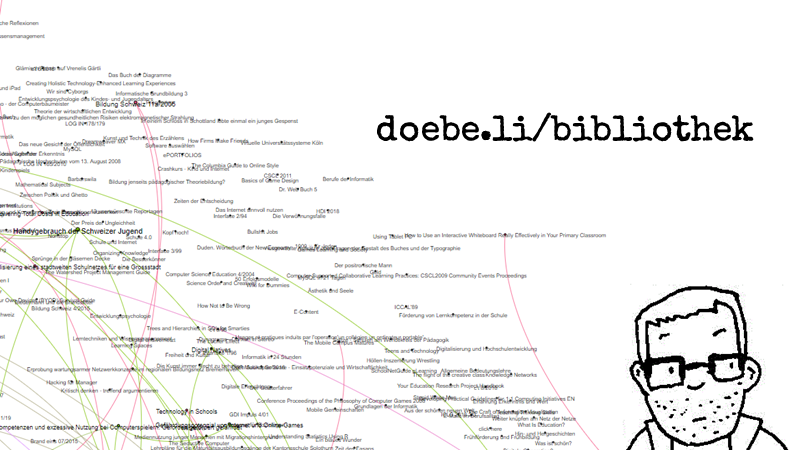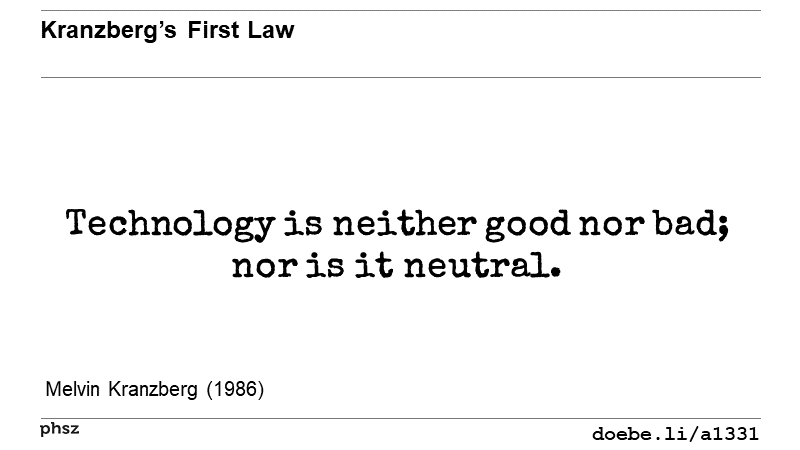Kranzberg’s First Law: Technology is neither good nor bad; nor is it neutral.
 Diese Seite wurde seit mehr als 7 Monaten inhaltlich nicht mehr aktualisiert.
Unter Umständen ist sie nicht mehr aktuell.
Diese Seite wurde seit mehr als 7 Monaten inhaltlich nicht mehr aktualisiert.
Unter Umständen ist sie nicht mehr aktuell.
 Definitionen
Definitionen
Kranzberg’s First Law reads as follows:
Technology is neither good nor bad; nor is it neutral.
Von Melvin Kranzberg im Text Technology and History: «Kranzberg Laws» (1986)  Bemerkungen
Bemerkungen
 Ich musste kürzlich bei erneuter Lektüre des entsprechenden Artikels feststellen, dass ich Kranzberg's first law falsch in Erinnerung hatte. Anders als von mir gedacht, drückt es nicht aus, dass Technologie eine Sichtweise der Welt in sich trägt, sondern dass Technologie in unterschiedlichen Kontexten unterschiedliche Wirkung haben kann.
Ich musste kürzlich bei erneuter Lektüre des entsprechenden Artikels feststellen, dass ich Kranzberg's first law falsch in Erinnerung hatte. Anders als von mir gedacht, drückt es nicht aus, dass Technologie eine Sichtweise der Welt in sich trägt, sondern dass Technologie in unterschiedlichen Kontexten unterschiedliche Wirkung haben kann.By that I mean that technology’s interaction with
the social ecology is such that technical developments
frequently have environmental, social, and human consequences that go far beyond the immediate purposes of
the technical devices and practices themselves, and the
same technology can have quite different results when
introduced into different contexts or under different
circumstances.
Von Melvin Kranzberg im Text Technology and History: «Kranzberg Laws» (1986) I think that my first law - Technology
is neither good nor bad; nor is it neutral - should constantly remind us that it is the historian’s duty to compare short-term versus long-term results, the utopian hopes versus the spotted actuality, the what-might-have been against what actually happened,
and the trade-offs among various &dquo;goods&dquo; and possible
&dquo;bads.&dquo; All of this can be done only by seeing how technology interacts in different ways with different values and institutions, indeed, with the entire
sociocultural milieu.
Von Melvin Kranzberg im Text Technology and History: «Kranzberg Laws» (1986)  Kranzberg’s First Law helps to clarify this situation: technology is neither good nor bad - nor is it neutral. At the risk of spoiling its Zenlike nature, let me propose an interpretation: a technology isn’t inherently good or bad, but it will have an impact, which is why it’s not neutral. Almost every applied technology has impact, and that impact will have a good side and a bad side. When you think of transportation technologies, for example, do you think of how they enable a delightful vacation or get the family back together during the holidays - or do you think of traffic jams and pollution? Are books a source of wisdom and spirituality or a way to distribute pornography and hate? Do you applaud medical technology for curing plagues or deplore transportation technology for spreading them? Does encrypted e-mail keep honest people safe from criminals or criminals safe from the police? Are plastics durable conveniences or everlasting pollutants? Counterfeiting comes with money, obscene phone calls come with the telephone, spam comes with e-mail, and pornography comes with the Internet. Every law creates an outlaw. 4
Kranzberg’s First Law helps to clarify this situation: technology is neither good nor bad - nor is it neutral. At the risk of spoiling its Zenlike nature, let me propose an interpretation: a technology isn’t inherently good or bad, but it will have an impact, which is why it’s not neutral. Almost every applied technology has impact, and that impact will have a good side and a bad side. When you think of transportation technologies, for example, do you think of how they enable a delightful vacation or get the family back together during the holidays - or do you think of traffic jams and pollution? Are books a source of wisdom and spirituality or a way to distribute pornography and hate? Do you applaud medical technology for curing plagues or deplore transportation technology for spreading them? Does encrypted e-mail keep honest people safe from criminals or criminals safe from the police? Are plastics durable conveniences or everlasting pollutants? Counterfeiting comes with money, obscene phone calls come with the telephone, spam comes with e-mail, and pornography comes with the Internet. Every law creates an outlaw. 4 Vorträge von Beat mit Bezug
Vorträge von Beat mit Bezug
 Zitationsgraph
Zitationsgraph
 Zitationsgraph (Beta-Test mit vis.js)
Zitationsgraph (Beta-Test mit vis.js)
 Zeitleiste
Zeitleiste
 18 Erwähnungen
18 Erwähnungen 
- Technology and History: «Kranzberg Laws» (Melvin Kranzberg) (1986)


- Der Aufstieg der Netzwerkgesellschaft (Manuel Castells) (1996)

- FutureHype - The Myths Of Technology Change (Bob Seidensticker) (2006)


- 1. The Birthday Present Syndrome
- The Future of Looking Back (Richard Banks) (2011)

- Facebook, Blogs und Wikis in der Schule (Philippe Wampfler) (2013)


- Die Zukunft der vernetzten Gesellschaft - Neue Spielregeln, neue Spielmacher (Karin Frick, Bettina Höchli) (2014)


- Inventing the Future - Postcapitalism and a World Without Work (Nick Srnicek, Alex Williams) (2015)

- ON/OFF - Risks and Rewards of the Anytime-Anywhere Internet (Sarah Genner) (2017)


- Smartphone-Demokratie - #FakeNews #Facebook #Bots #Populismus #Weibo #Civictech (Adrienne Fichter) (2017)

- Von A(pfelkuchen) bis Z(ollkontrolle) - Weshalb Algorithmen nicht neutral sind (Anna Jobin)


- Von A(pfelkuchen) bis Z(ollkontrolle) - Weshalb Algorithmen nicht neutral sind (Anna Jobin)
- Handbook of Technology Education (Marc J. de Vries) (2017)


- 66. Technology and Children´s Literature (Cecilia Axell)


- 66. Technology and Children´s Literature (Cecilia Axell)
- Die grosse Gereiztheit - Wege aus der kollektiven Erregung (Bernhard Pörksen) (2018)

- Was bei Algorithmen hinten herauskommt, weiss niemand so genau - und warum, noch viel weniger (Anna Jobin) (2018)


- (Un)berechenbar? - Algorithmen und Automatisierung in Staat und Gesellschaft (Resa Mohabbat Kar, Basanta Thapa, Peter Parycek) (2018)


- Pädagogik 05/2021 (2021)

- Digitalisierung aus pädagogische Perspektive (2021)
- Der Wert der Digitalisierung - Gemeinwohl in der digitalen Welt (Chris Piallat) (2021)


- Alles überall auf einmal - Wie Künstliche Intelligenz unsere Welt verändert und was wir dabei gewinnen können (Miriam Meckel, Léa Steinacker) (2024)

- The impact of generative artificial intelligence on socioeconomic inequalities and policymaking (Valerio Capraro, Austin Lentsch, Daron Acemoglu, Selin Akgun, Aisel Akhmedova, Ennio Bilancini, Jean-François Bonnefon, Pablo Brañas-Garza, Luigi Butera, Karen Douglas, Jim Everett, Gerd Gigerenzer, Christine Greenhow, Daniel Hashimoto, Julianne Holt-Lunstad, Jolanda Jetten, Simon Johnson, Werner Kunz, Chiara Longoni, Pete Lunn, Simone Natale, Stefanie Paluch, Iyad Rahwan, Neil Selwyn, Vivek Singh, Siddharth Suri, Jennifer Sutcliffe, Joe Tomlinson, Sander van der Linden, Paul Van Lange, Friederike Wall, Jay Van Bavel, Riccardo Viale) (2024)
















 Biblionetz-History
Biblionetz-History